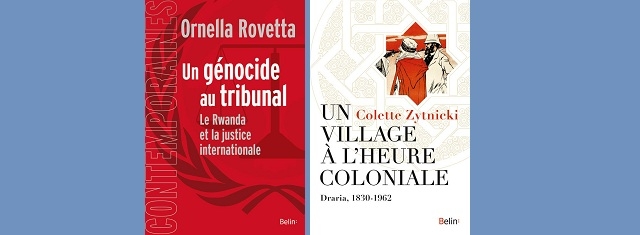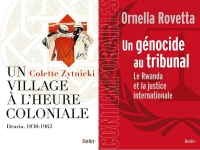Arts
INTERNATIONAL CRIMINAL TRIBUNAL FOR RWANDA - VIOLENCE IN THE ALGERIAN COLONY
Published by BELIN Editions

(Source: Belin Editions)
USPA NEWS -
The Domination / Colonization / Genocide of Indigenous Peoples is the Mass Destruction of Entire Communities of Indigenous Peoples. Indigenous Peoples are understood to be People whose Historical and Current Territory has become occupied by Colonial Expansion, or the Formation of a State by a Dominant Group such as a Colonial Power.... Nowadays, in an Era of Globalization, Leaders of "Recognized" Nations often discuss the Development of Indigenous Resources without inviting their Leaders to the Table....
The Domination / Colonization / Genocide of Indigenous Peoples is the Mass Destruction of Entire Communities of Indigenous Peoples. Indigenous Peoples are understood to be People whose Historical and Current Territory has become occupied by Colonial Expansion, or the Formation of a State by a Dominant Group such as a Colonial Power.... Nowadays, in an Era of Globalization, Leaders of "Recognized" Nations often discuss the Development of Indigenous Resources without inviting their Leaders to the Table....
Many Western States have justified their Domination of Indigenous Peoples through Racist, Illogical Theories such as Terra Nullius, by which Indigenous Lands are considered "Unoccupied" and "Empty," their Inhabitants deemed unable to manage their Resources or conceive of Property. Under such a Policy, Colonial and Corporate Elites, backed by a Legal Apparatus and Scientific Methods, are able to purchase and use Land that does not belong to them. As Colonial Policies are increasingly contested and proved Unjustifiable, Governments continue to implement "Development" Projects. The Illusion that Development Projects are undertaken in their Interest faded long ago for Indigenous Peoples.
Postcolonialism signals a Possible Future of Overcoming Colonialism, yet new Forms of Domination or Subordination can come in the Wake of such Changes, including new Forms of Global Empire. Postcolonialism should not be confused with the Claim that the World we live in now is actually Devoid of Colonialism.
- "Un Génocide Au Tribunal - Le Rwanda et la Justice Internationale" (A Genocide in Court - Rwanda and the International Justice) by Ornella Rovetta and published in FRANCE by Belin Editions. The Author is an Academic at Centre de Recherche Mondes Modernes et Contemporaines, Université Libre de Bruxelles. Since 10 years, she devotes her Research to Rwanda and the History of International Criminal Justice. Rwanda's Community Courts, known as Gacaca, were working trying those accused of Involvement in the 1994 Genocide. The Courts were set up to speed up the Prosecution of Hundreds of Thousands of Genocide Suspects awaiting Trial.... Rwanda's Legal System was left in Ruins after the Massacres by Ethnic Hutu Militia and Soldiers of some 800,000 Minority Tutsis and Politically Moderate Hutus in 100 Days between April and June 1994.
The UN Statute of the International Tribunal for Rwanda - Article 3 : Crimes against Humanity "The International Tribunal for Rwanda shall have the power to prosecute persons responsible for the following crimes when committed as part of a widespread or systematic attack against any civilian population on national, political, ethnic, racial or religious grounds: (a) Murder; (b) Extermination; (c) Enslavement; (d) Deportation; (e) Imprisonment; (f) Torture; (g) Rape; (h) Persecutions on political, racial and religious grounds; (i) Other inhumane acts.". The Author goes through all those aspects and also through History that made this happened.
- "Un Village à l'Heure Coloniale - Draria, 1830-1962" (A Village During Colonization - Draria (name à of a Village), 1830-1962). By Colette Zytnicki and published in FRANCE by Belin Editions. The Author is Professor Emeritus at the Université Toulouse-Jean Jaurès / Laboratoire FRAMESPA and VP of La Société Française d'Histoire des Outre-Mers. She is an Expert on the History of Algeria in the Colonial Period. Violence in its many Forms, and Colonial Violence in particular, has been the Focus of a Wave of Recent Scholarly Literature. Stimulated, no doubt, by the Violence and Imperialist Activities of the Twenty-First Century, much of which has occurred in Former Colonial Territories, one Question that has preoccupied Scholars with an Interest in the Subject is the Extent to which Violence in Colonial Territories was Genocidal.
French Algeria, also known as Colonial Algeria, began in 1830 with the Invasion of Algiers and lasted until 1962, under a Variety of Governmental Systems. From 1848 until Independence, the whole Mediterranean Region of Algeria was administered as an Integral Part of France. One of France's Longest-Held Overseas Territories, Algeria became a Destination for Hundreds of Thousands of European Immigrants known as Colons and, later, as Pieds-Noirs. However, the Indigenous Muslim Population remained a Majority of the Territory's Population throughout its History. Gradually, Dissatisfaction among the Muslim Population with its Lack of Political and Economic Status fueled Calls for Greater Political Autonomy, and eventually Independence from France. Tensions between the Two Population Groups came to a head in 1954, when the First Violent Events began of what was later called the Algerian War, characterized by Guerrilla Warfare and Illegal Methods used by the French in order to put down the Revolt. The War concluded in 1962, when Algeria gained Independence following the March 1962 Evian Agreements and the July 1962 Self-Determination Referendum.
A Commission of Inquiry established by the French Senate in 1892 and headed by Former Premier JULES FERRY, an Advocate of Colonial Expansion, recommended that the Government abandon a Policy that assumed French Law, without Major Modifications, could fit the Needs of an Area inhabited by close to Two million Europeans and Four million Muslims. Muslims had no Representation in the French National Assembly before 1945 and were grossly Under-Represented on Local Councils. Because of the many Restrictions imposed by the Authorities, by 1915 only 50,000 Muslims were eligible to vote in Elections in the Civil Communes. Attempts to implement even the most Modest Reforms were blocked or delayed by the Local Administration in Algeria, dominated by Colons, and by the 27 Colon Representatives in the National Assembly (six Deputies and three Senators from each Department)....
Ruby BIRD
http://www.portfolio.uspa24.com/
Yasmina BEDDOU
http://www.yasmina-beddou.uspa24.com/
Ruby BIRD
http://www.portfolio.uspa24.com/
Yasmina BEDDOU
http://www.yasmina-beddou.uspa24.com/
Ruby Bird Yasmina Beddou Un Genocide Au Tribunal Ornella Rovetta Un Village A L Heure Coloniale Colette Zytnicki Belin Edions Le Rwanda Et La Justice Internationale Draria 1830 1962
Liability for this article lies with the author, who also holds the copyright. Editorial content from USPA may be quoted on other websites as long as the quote comprises no more than 5% of the entire text, is marked as such and the source is named (via hyperlink).






